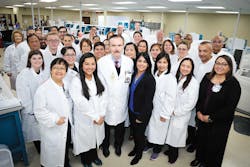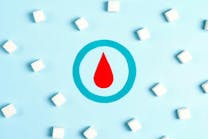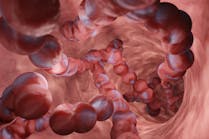UMC was named one the best companies to work for in Texas six of the past seven years with a featured article in Texas Monthly. Most Wired: Health Care’s Most Wired acknowledged UMC as having a higher level of technology adoption, geared toward improved patient care and safety.
UMC also received Magnet Designation and joined the top seven percent of hospitals in the nation by earning Magnet Recognition from the American Nurses Credentialing Center—one of the highest achievements a hospital can attain.
In 2018, the UMC Clinical Laboratory had a complete transformation including a new laboratory director, assistant director, supervisors, and a total renovation of the clinical laboratory. Employee satisfaction rose to 99 percent overall vs. the previous year’s 73 percent.
Customer service
UMC Clinical Laboratory provides an online portal for external customers to connect with physicians and their medical records. The system facilitates communication with the primary healthcare provider and allows access to crucial documents such as medications, immunizations, medical history, and test results. Physicians, nurses, and employees have specialized portal access.
UMC has multiple clinics surrounding Lubbock which makes it convenient and efficient for patients to receive treatment and phlebotomy services. This number has increased steadily to over 48,000 annual phlebotomy collections for these outpatient clinics.
Customer service at UMC also includes its employees. Their Wellness Program addresses the well-being of staff by providing participation challenges. Completion of these challenges earns points. Quarterly and annual prizes are awarded based on point totals.
Productivity
The Chemistry department purchased two Roche COBAS 8000 analyzers to meet the needs of increased laboratory testing (1.3 million tests per year). The Hematology department also purchased a new analyzer and the instrumentation was attached to an automated line. The whole laboratory was renovated to be Lean. Hematology lead the way into innovation by installing the Sysmex XN-9100 and the Sysmex SP-50 Slide Makes/Stainer. The reduction in manual differential percentage from the previous analyzer decreased from 27 to 11 percent in the first three months. New advanced hematology parameters were introduced to assist providers in diagnosis, treatment, and maintenance of several patient conditions to include immature platelet fractions, reticulocyte hemoglobin, and immature granulocytes. The auto-validation rate for the Sysmex was 70 to 75 percent vs. 20 percent for the previous analyzer.
Implementation of an Individualized Quality Control Plan (IQCP) program for thromboelastogram (TEG) testing projected savings of $87k per year. In addition, Transfusion Services installed a new Neo analyzer which expanded testing to include phenotyping and batch testing for in and out patients to assist with prioritizing STAT testing as to not delay patient care.
The laboratory also participated in UMCs Annual Waste Walk to promote efficiency which yielded $5.3 million dollars in savings which is allocated to employees for their Sharing Success Bonus.
Teamwork
The 2018 Employee Satisfaction Survey was nationally ranked at the 99th percentile. A “Behind the Badge Campaign” was implemented by UMC and is a standard that addresses the need to value the person behind the badge. This is a recognition, respect, and replenish campaign to assist each employee to take care of themselves.
The teamwork at UMC clinical laboratory goes far beyond the clinical setting. Staff volunteers every third Sunday of the month to provide meals to those in need.
Education and training
Education and training within the UMC Clinical Laboratory focuses on enabling employees to engage and grow within their profession, organization, and community. The implementation of a “Career Ladder” bolsters learning and participation via individual projects, maintaining CEU’s by purchasing membership through MediaLab for all employees, organizational participation, and community service. Phlebotomists, processers, and technologists can also benefit from participation by receiving a monetary reward for completion of the criteria and has reward levels of $500, $1,000, $1,500, and $2,000. The clinical lab’s affiliation with TTUHSC allows CLS students to complete rotations within each department; many of who are hired as employees. Lab staff is encouraged to train on- and off- site with every analyzer in each department. Cross training is also encouraged for employees who want to learn the processes of other departments and serves as a pathway for advancement. Leadership encourages staff members to apply and continue their education with CAP to become certified laboratory inspectors. Tuition reimbursement is also offered.
Strategic outlook
The clinical laboratory implements pillars for a strategic plan. The pillars serve as a pathway toward success and align with the culture set forth with UMC hospital. Each pillar focuses on several important actions along with the vision and mission for each department. For example, the service pillar addresses the entire patient experience from stem to stern with the goal to differentiate the clinical lab as the market leader in patient satisfaction.
Lab inspections
In 2018 the clinical laboratory had a successful DMV, FDA, and AABB inspection. An upcoming 2019 CAP inspection has everyone pulling together to ensure compliance and seek out issues needing resolution. UMC’s laboratory had several citations in 2017. Some were corrected on-site, and others had corrective actions performed to ensure compliance. Supervisors delegated additional duties to the technologists to ensure full compliance with CAP. Continuous process improvement is a job that everyone in the laboratory performs.







